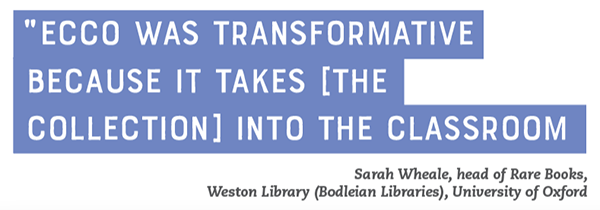The World’s Largest Online Historical Archive of Eighteenth Century Studies Turns 20
This year marks the 20th anniversary of Gale’s “Eighteenth Century Collections Online” (ECCO), the largest collection—32 million pages—of 18th-century books, pamphlets, periodicals, and other ephemera in the world. ECCO was revolutionary in providing researchers and students a text-searchable corpus at their desktops 24/7.

This year marks the 20th anniversary of Gale’s “Eighteenth Century Collections Online” (ECCO), the largest collection—32 million pages—of 18th-century books, pamphlets, periodicals, and other ephemera in the world. ECCO was revolutionary in providing researchers and students a text-searchable corpus at their desktops 24/7.
 The origins of ECCO lie in the microfilm series, The Eighteenth Century, which from 1982 published facsimile images of 18th-century books based on the British Library’s recently created machine-readable English Short Title Catalogue (ESTC). Books were filmed at 20 libraries in the UK, Ireland, and US, notably the British Library, the Bodleian, Harvard, National Library of Scotland, and Cambridge University.
The origins of ECCO lie in the microfilm series, The Eighteenth Century, which from 1982 published facsimile images of 18th-century books based on the British Library’s recently created machine-readable English Short Title Catalogue (ESTC). Books were filmed at 20 libraries in the UK, Ireland, and US, notably the British Library, the Bodleian, Harvard, National Library of Scotland, and Cambridge University.
The goal was to “include every significant monograph published between 1701 and 1800 in the English language, and every significant monograph in any language printed in the British Empire during that period,” says Julia de Mowbray, publisher at Gale. “Also, all first editions published in the 18th century and all variant editions” were included.
In the mid-1990s, libraries started digitizing their collections, often from microfilm surrogates. Gale’s first digital archive, the Times Literary Supplement Centenary Archive, was published in 1999, and in 2000, Gale started digitizing “The Eighteenth Century” microfilms, creating ECCO. The interface was designed with the book reader in mind.
ECCO was published in seven subject modules over 2003-2004, with a supplement in 2010. The biggest portion of ECCO is the subject module Literature and Language, comprising 28 percent of all entries, followed by Religion & Philosophy (24 percent) and History & Geography (16 percent).
A major source library for ECCO and a major user of the database is the Bodleian Libraries at the University of Oxford. “It is widely used for teaching undergraduates,” says Sarah Wheale, head of Rare Books at Weston Library (Bodleian Libraries). “ECCO was transformative because it takes [the collection] into the classroom remotely.”

Optical character recognition (OCR) software captured the materials on the microfilm not as static images, but as actual text. This fact, along with the addition of ESTC metadata, made ECCO a more valuable resource as users could search all the texts by a wide variety of criteria. “You could search across multiple texts or all the text in the database,” says de Mowbray.
“They also indexed the back matter—these are early printed indexes,“ adds Isabel Holowaty, deputy head of Humanities Libraries at the Bodleian Libraries. “The fact that they are separately searchable in ECCO I think is fantastic.”
More than 500 institutions worldwide—public and academic libraries, as well as some schools—have access to ECCO. Responding to new research methods is the Gale Digital Scholar Lab, an environment for text and data mining that enables users to do textual analysis; ECCO is one of its most heavily used data sets.
Other ECCO users have seen it transform learning experiences. According to an article in The History Teacher (Vol. 51, No.4), East Carolina University’s Professor Timothy Jenks found that online materials like ECCO enhanced student understanding of 18th-century life, while another in The Eighteenth-Century Intelligencer, 2009, describes how West Chester University’s Dr. Eleanor Shevlinat had her students search “coffee houses” for one class project—and the works that ECCO found showed the important role coffee houses played in 18th-century culture.
To learn more about ECCO visit: gale.com/ecco.
SPONSORED CONTENT
RELATED
ALREADY A SUBSCRIBER? LOG IN
We are currently offering this content for free. Sign up now to activate your personal profile, where you can save articles for future viewing










Add Comment :-
Comment Policy:
Comment should not be empty !!!